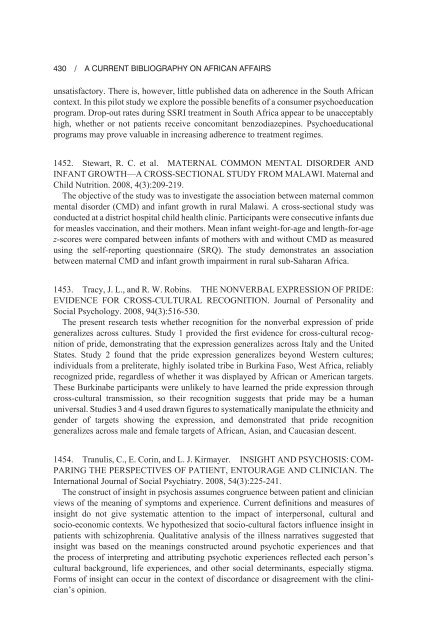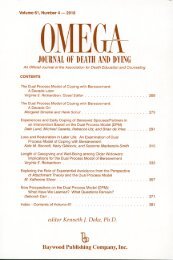A Current Bibliography on African Affairs - Baywood Publishing
A Current Bibliography on African Affairs - Baywood Publishing
A Current Bibliography on African Affairs - Baywood Publishing
Create successful ePaper yourself
Turn your PDF publications into a flip-book with our unique Google optimized e-Paper software.
430 / A CURRENT BIBLIOGRAPHY ON AFRICAN AFFAIRS<br />
unsatisfactory. There is, however, little published data <strong>on</strong> adherence in the South <strong>African</strong><br />
c<strong>on</strong>text. In this pilot study we explore the possible benefits of a c<strong>on</strong>sumer psychoeducati<strong>on</strong><br />
program. Drop-out rates during SSRI treatment in South Africa appear to be unacceptably<br />
high, whether or not patients receive c<strong>on</strong>comitant benzodiazepines. Psychoeducati<strong>on</strong>al<br />
programs may prove valuable in increasing adherence to treatment regimes.<br />
1452. Stewart, R. C. et al. MATERNAL COMMON MENTAL DISORDER AND<br />
INFANT GROWTH—A CROSS-SECTIONAL STUDY FROM MALAWI. Maternal and<br />
Child Nutriti<strong>on</strong>. 2008, 4(3):209-219.<br />
The objective of the study was to investigate the associati<strong>on</strong> between maternal comm<strong>on</strong><br />
mental disorder (CMD) and infant growth in rural Malawi. A cross-secti<strong>on</strong>al study was<br />
c<strong>on</strong>ducted at a district hospital child health clinic. Participants were c<strong>on</strong>secutive infants due<br />
for measles vaccinati<strong>on</strong>, and their mothers. Mean infant weight-for-age and length-for-age<br />
z-scores were compared between infants of mothers with and without CMD as measured<br />
using the self-reporting questi<strong>on</strong>naire (SRQ). The study dem<strong>on</strong>strates an associati<strong>on</strong><br />
between maternal CMD and infant growth impairment in rural sub-Saharan Africa.<br />
1453. Tracy, J. L., and R. W. Robins. THE NONVERBAL EXPRESSION OF PRIDE:<br />
EVIDENCE FOR CROSS-CULTURAL RECOGNITION. Journal of Pers<strong>on</strong>ality and<br />
Social Psychology. 2008, 94(3):516-530.<br />
The present research tests whether recogniti<strong>on</strong> for the n<strong>on</strong>verbal expressi<strong>on</strong> of pride<br />
generalizes across cultures. Study 1 provided the first evidence for cross-cultural recogniti<strong>on</strong><br />
of pride, dem<strong>on</strong>strating that the expressi<strong>on</strong> generalizes across Italy and the United<br />
States. Study 2 found that the pride expressi<strong>on</strong> generalizes bey<strong>on</strong>d Western cultures;<br />
individuals from a preliterate, highly isolated tribe in Burkina Faso, West Africa, reliably<br />
recognized pride, regardless of whether it was displayed by <strong>African</strong> or American targets.<br />
These Burkinabe participants were unlikely to have learned the pride expressi<strong>on</strong> through<br />
cross-cultural transmissi<strong>on</strong>, so their recogniti<strong>on</strong> suggests that pride may be a human<br />
universal. Studies 3 and 4 used drawn figures to systematically manipulate the ethnicity and<br />
gender of targets showing the expressi<strong>on</strong>, and dem<strong>on</strong>strated that pride recogniti<strong>on</strong><br />
generalizes across male and female targets of <strong>African</strong>, Asian, and Caucasian descent.<br />
1454. Tranulis, C., E. Corin, and L. J. Kirmayer. INSIGHT AND PSYCHOSIS: COM-<br />
PARING THE PERSPECTIVES OF PATIENT, ENTOURAGE AND CLINICIAN. The<br />
Internati<strong>on</strong>al Journal of Social Psychiatry. 2008, 54(3):225-241.<br />
The c<strong>on</strong>struct of insight in psychosis assumes c<strong>on</strong>gruence between patient and clinician<br />
views of the meaning of symptoms and experience. <str<strong>on</strong>g>Current</str<strong>on</strong>g> definiti<strong>on</strong>s and measures of<br />
insight do not give systematic attenti<strong>on</strong> to the impact of interpers<strong>on</strong>al, cultural and<br />
socio-ec<strong>on</strong>omic c<strong>on</strong>texts. We hypothesized that socio-cultural factors influence insight in<br />
patients with schizophrenia. Qualitative analysis of the illness narratives suggested that<br />
insight was based <strong>on</strong> the meanings c<strong>on</strong>structed around psychotic experiences and that<br />
the process of interpreting and attributing psychotic experiences reflected each pers<strong>on</strong>’s<br />
cultural background, life experiences, and other social determinants, especially stigma.<br />
Forms of insight can occur in the c<strong>on</strong>text of discordance or disagreement with the clinician’s<br />
opini<strong>on</strong>.




